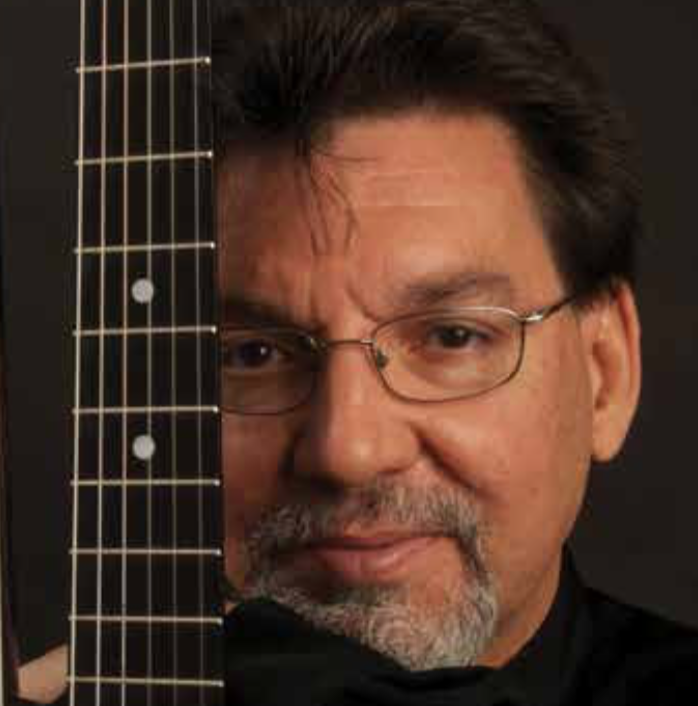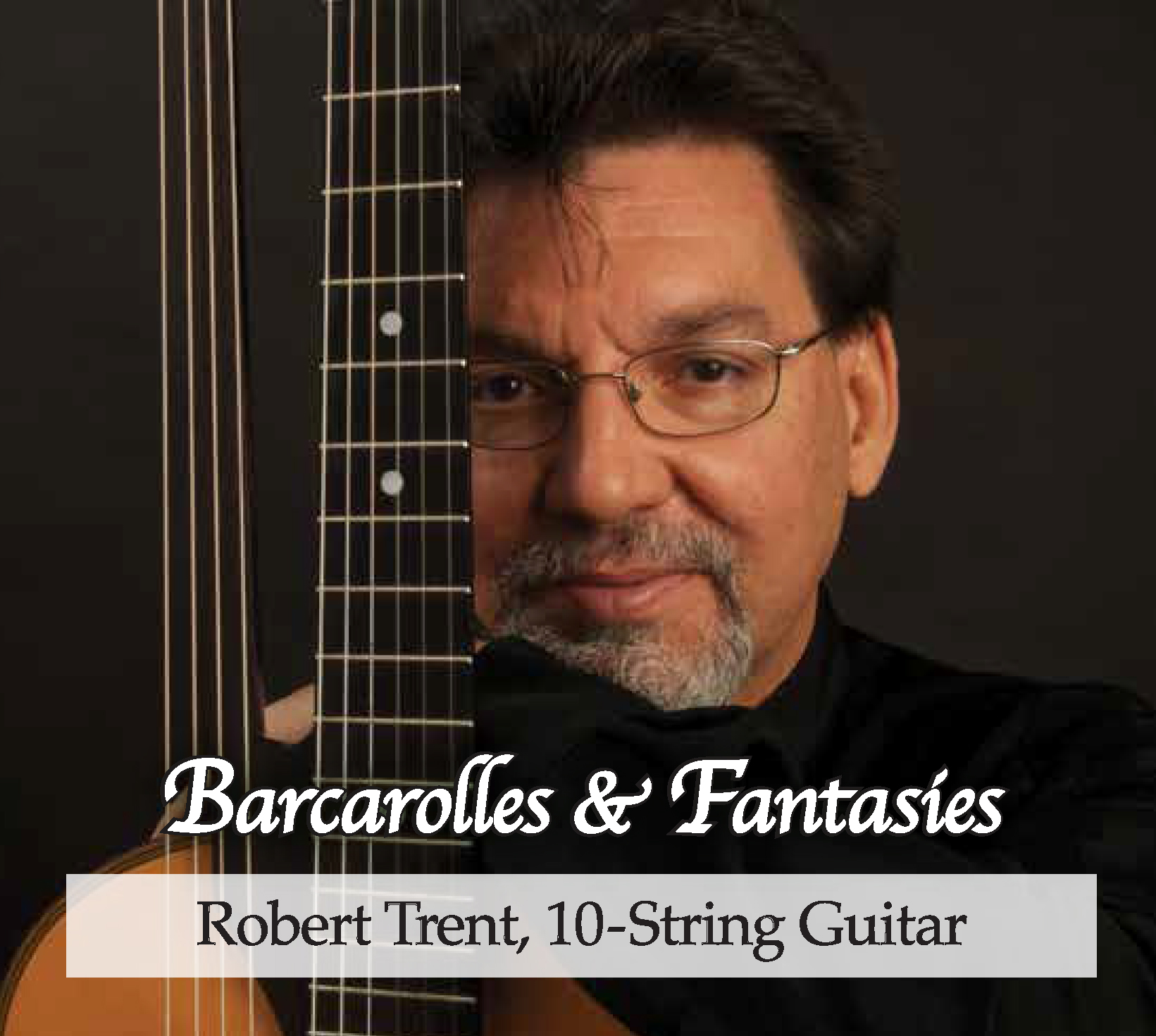
Fine Classical, Instrumental, and Specialty Recordings
Label: Soundset Recordings Item Number: SR1113 Format: CD Year Recorded: 2012 Barcarolles and Fantasies Robert Trent
Robert Trent  Classical Guitar soloist, performer of chamber music and concerti, Robert Trent appears regularly on the concert stage in North and South America, Europe, and in Asia, performing modern guitar, Renaissance lute, archlute, and historic instruments of the nineteenth-century, including a reproduction of a 10-string double-necked romantic guitar of J.G. Scherzer (reproduced by Gary Southwell) heard in this recording. Robert Trent often performs his own arrangements and original works for six and ten-string guitar. He has appeared with the Audubon String Quartet, Kandinsky Trio, the Philadelphia Orchestra, and the Philadelphia Virtuosi Chamber Orchestra. A first prize winner in National and International competitions, including; the Webb National Guitar Competition, Masterworks Young Artist Competition (for all instruments) and the chamber music prize at the International Competition “Arturo Toscanini” in Italy in Period Instrumental performance. In addition to his recording for Soundset, he has recorded for Dorian Records© (with Duo Firenze) in “Italian Nocturnes: Music for Fortepiano and Early 19thc. Guitar” he is also featured on CD “Traveler’s Tales” TownHall Records (CPS-8776), with flutist Leslie Marrs (Oasis label) entitled, “Robert Fruehwald: Flute and Guitar Music”, on Archlute on the recent “Concerts Royaux” on Epiphany Records. The first recipient of the degree of Doctor of Musical Arts from The Peabody Institute of The Johns Hopkins University. Dr. Trent is in his 27th year as Full Professor of Music at Radford University where he is in his 19th year as director of Radford University’s Annual International Guitar Festival. Many of his students are performers, educators and administrators at all levels in the U.S., and in Asia. The blind guitarist-composer Antonio Jimenez Manjon influenced a number of guitarist-composers who would follow him, including Augustin Barrios and Miguel Llobet. Dominigo Prat mentions that he himself studied with Aguado. By the age of 14 Manjon had appeared in a solo recital in Paris before finally settling in Buenos Aires. Even these early programs involve his multi-stringed guitar for which the present piece was written. The “Fantasia Gitana”, a longtime unpublished piece, existing only in manuscript, is now available through the work of Alan Rinehart as published by Editions Chantarelle. Note by Robert Trent “It was not until I heard the playing of Robert Trent during a year as his colleague at Radford University that I became fascinated with the sonic possibilities of the guitar. Begun at the Oregon Bach Festival during the Summer of 1996 and completed during the following season, “Barcarolle” was written at his request, and with his particular gifts in mind. The remarkably subtle gradations in color that he is able to summon from the instrument and the distinctive ways in which he is able to maintain the integrity and direction of various lines within a texture suggested the musical ideas of the piece. As it was conceived during a festival of J.S. Bach’s works, the point of departure is a melody that opens with the intervals found in the musical spelling of the great patriarch’s name. What follows is a piece about the spinning of long lyrical lines, and lines against and within them, that I was sure Robert would project beautifully. The rocking six, nine, or twelve-eight metric scheme of the of the barcarolle, or boat-song, is here shifted to groups of seven in the piece’s principal idea. This marks the fourth of five in the genre that I have composed to date, the others being written for solo piano”. Note by Daniel Crozier Composed in the years shortly before his death, the “Trois Morceaus Op. 65” contains some of Johann Kaspar Mertz’ most original and effective material. It is probably this work, performed by Mertz for his patron Ludwig of Bavaria (1855), who, as the story goes, “was incredulous that an instrument so modest in appearance with just ten (!) strings could produce such an effect.” “Fantasie Hongroise (Hungarian Fantasy) employs all elements of fiery, gypsy emotive performance, with capricious tempo and harmonic changes, double-triple glissandi, including a dangerous and heroic slide to the highest ‘a’ on the instrument. In the second piece in the set, “Fantasie Originale”, we hear Mertz’ masterful use of continuous harmonic tremolandi driving the piece forward as a device of sustain. The tryptich closes in the mesmerizing and dramatic “Le Gondolier (Barcarolle)”. Here, all of Mertz’ compositional and guitaristic devices are brought to bear in a dramatic character piece worthy of an operatic scena. The gentle barcarolle, representing the central ‘character’ of the piece meets his demise in the final moments of the piece; the two final chords bring down the curtain on our unfortunate hero. Note by R. Trent Napoleon Coste’s “La Source du Lyson” (source of the Lyson River), sometimes referred to as the guitarist’s “Moldau”, is a musical depiction of a painting by Gustave Corbet that shows the source of the Lyson River in France as it is ‘born’ gushing forth from a grotto. Coste’s tryptich makes use of the guitar’s ability to play rapid tremolo in suggesting this gushing forth; while, his mastery of chorale style writing leads the listener along the river’s passing of a church; with the final section taking the listener to a festival of revelers he titles as “Fete Villagoise”. Note by R. Trent Unable to deal to find any other way to deal with the day of the 9/11 attack on the United States, I went to my home studio, picked up my guitar and improvised this piece. The sound and the visual I shall now describe happened as one big flash in my mind. The piece is an homage to J.R.R. Tolkien, a scene where the hobbit Pippin is nearly taken in by Sauron by way of Pippin's gazing into the Palantir. The first celtic-like theme represents Pippin's innocence. The middle section represents Pippin and Sauron's encounter via the Palantir and the ensuing struggle. At last Pippin frees himself from the influence of Sauron and this moment manifests itself in the transformation of the celtic Pippin theme at the end. The lesson that evil need not be he response to evil is indeed implied not only in the response, but in the calming ending. Note by R. Trent
Label: Soundset Recordings Item Number: SR1113 Format: CD Year Recorded: 2012 Recording, Editing, and Mastering Paul Bensel Nineteenth century Barcarolles, Mertz’s Le Gondolier and Coste’s depiction of the Lyson River in France, find a companion in Daniel Crozier’s modern invention. Romantic fantasies of Mertz, Coste, Manjón find a modern companion in Trent’s modern fantasy, as all are finally heard with the intended low bass notes. Album design: SwensonDesign Mpls, MN Recording, Editing, and Mastering: Paul Bensel Columbia Recording Columbia, MD Not Available | ||||||||||||||||||||||||||||||||||||||||||||||||||||||

 Amazon
Amazon Follow Us on Twitter
Follow Us on Twitter Follow Us on Instagram
Follow Us on Instagram Visit Our Partner Soundset Recordings
Visit Our Partner Soundset Recordings